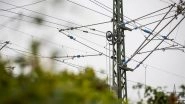Washington D.C. [USA], June 16 (ANI): A recent study has highlighted gender imbalance within the energy field in the UK and how researchers are working hard to channelise female talent in the energy system.The study has been conducted by a team of researchers from the University of Exeter's Energy Policy Group, who analysed the gender imbalance and spoke to several female researchers about their experiences of academic life.The research report comes just after the UK parliament declares a climate emergency while the government commits to legislating for a 2050 net-zero greenhouse gas emissions target.The study has unveiled that women are still significantly under-represented in the energy research field and application rates from women are low.The report also highlighted the 'significant drop-off' between the number of female Ph.D. students and funded researchers -- meaning that the sector losses some of the efficient talents at an early age.The research brings forward four important ways in which universities can work together to improve gender imbalance.Jess Britton, one of the researchers, said: "Progress on gender balance in research has been too slow for too long, but we think now is the time to bring together action across funders and universities to ensure that female talent is capitalising on."In the research, the researchers spoke to 59 female academics while conducting the energy research and from various disciplines, institutions and career stages. They also analysed available data on gender and energy research funding.Crucially, interviews with the researchers unearthed an array of issues that were felt to be holding women back from career progression including the detrimental impact of part-time work or maternity leave, and inherent institutional and funding bias towards established, male academics.While the report also says that since 2017 there has been some progress in the gender balance of Peer Review Panel Members and small increases in awards granted to female researchers, progress has remained slow.The study suggests that any progress should be accompanied by systemic change within the institutional structures and cultural environment of institutions involved with energy research.Following are some of the important ways in which UKRI, other funders, and universities can work to improve gender balance.Look at the data: There remain significant difficulties in accessing meaningful data on gender balance in energy research. Data should be published, used to set targets, monitor progress and provide annual updates.The report also suggested using quantitative and qualitative data to identify key intervention points, speaking to more female energy academics to identify biases and barriers, and continuing to improve gender balance in funding review processes.Fund more women: The report identified that funding structures can be a barrier and that both part-time working and career breaks are perceived to slow progress. It suggests that the assessment of part-time working and maternity leave needs to be standardised across funder eligibility criteria and in the review process.Stimulate career progression for female energy academics: The report highlights the need to acknowledge and take action on the individualistic, long hours culture of academia and also overhaul existing institutional structures and cultures.Early career stages are often characterised by precarious fixed-term contracts and over-reliance on quantitative measures of progress. It also recommended building suitable training, mentoring and support networks to help more women progress and ensure the visibility of female researchers.Build on what is working: The study recommended identifying key points of engagement to build gender balance: combine specific targeted actions, such as UKRI and university frameworks and targeted funding initiatives, with long-term action on structural issues that promote cultural change in our institutions. (ANI)
(The above story is verified and authored by ANI staff, ANI is South Asia's leading multimedia news agency with over 100 bureaus in India, South Asia and across the globe. ANI brings the latest news on Politics and Current Affairs in India & around the World, Sports, Health, Fitness, Entertainment, & News. The views appearing in the above post do not reflect the opinions of LatestLY)













 Quickly
Quickly


